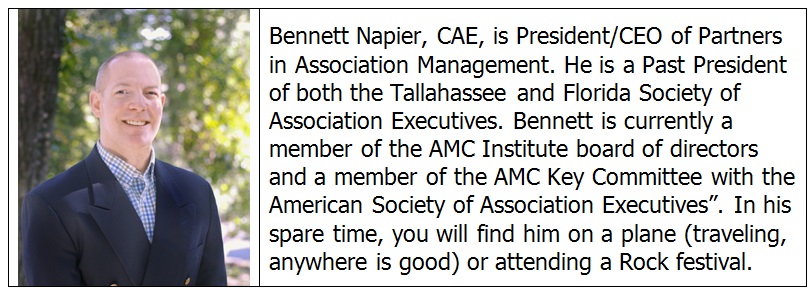By: Bennett Napier, CAE
In association management, diversity of revenue streams is increasingly important. Making all of your revenue off of just dues or meetings/events can place an organization in a precarious position. Many successful organizations are able to not only grow revenue but also ride out lean times with affinity income, when dues or meetings revenue may see dips based on economic conditions.
However, there is a catch. Affinity programs which bring in non-dues revenue does have to be done properly due to Unrelated Business Income Tax (UBIT) regulations.
Income derived from association activities that are substantially related to the association’s tax-exempt purposes is generally exempt from federal corporate income tax.
Income from unrelated business activities regularly conducted that are not substantially related to the association s purposes is generally taxable as unrelated business income (UBIT). In certain circumstances, even income from activities that fit this definition and that would otherwise constitute taxable income may be exempt from tax if the income qualifies for one of several permitted exclusions from UBIT. One of the most important exclusions relates to “royalty” income.
In certain circumstances, even income from activities that fit this definition and that would otherwise constitute taxable income may be exempt from tax if the income qualifies for one of several permitted exclusions from UBIT. One of the most important exclusions relates to “royalty” income.
Here are some basic tips to consider when forming agreements with affinity/third party vendors:
Options for Structuring Endorsement Arrangements
- Royalties Only
The endorsement or licensing contract that carries the lowest risk of UBIT liability is one in which the association license(s) its name, logo, and/or mailing list; exercises quality control over the use of its intangible property by the vendor; and not much more.
However, even under this scheme, the IRS and courts have indicated that an association may engage in certain limited activities without jeopardizing the tax-free royalty treatment of its income.
If administrative and/or marketing services are required, from a tax perspective it is generally preferable to outsource such services to an unrelated third party or to the association’s taxable subsidiary (with the association and subsidiary entering into separate, independent contracts with the vendor).
-
 Royalties to an association, services income to a third-party or taxable subsidiary.
Royalties to an association, services income to a third-party or taxable subsidiary.
If administrative and/or marketing services are required, from a tax perspective it is generally preferable to outsource such services to an unrelated third party or to the association s taxable subsidiary (with the association and subsidiary entering into separate, independent contracts with the vendor).
In a 1999 Private Letter Ruling issued to the American Association of Retired Persons (AARP), the IRS validated the use of an AARP-owned taxable subsidiary to provide such services, provided it is done on an arm’s-length basis (e.g., fair-market valuation of the payments to each entity, financial separation, employee time records).
- Royalties to association; services income to association.
If such services must be provided by the association directly, then separate, independent, unrelated contracts should be drafted to provide for the name, logo, and/or mailing list licensing on the one hand and the administrative and/or marketing services on the other
The fees earned by the association should be divided between the two contracts pursuant to some fair-market valuation. The former should be treated as tax-exempt royalty income, the latter as taxable UBIT.
Part II in this series will focus on contract provisions to be included in affinity agreements.





